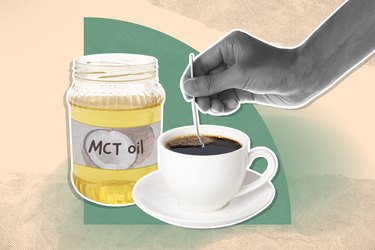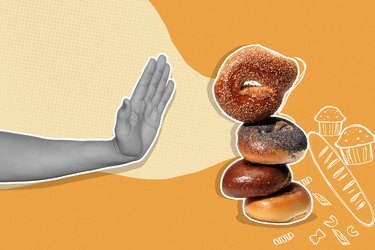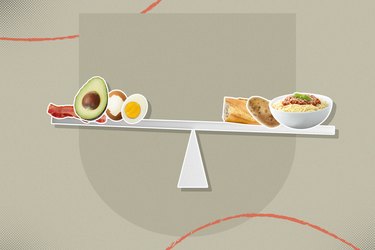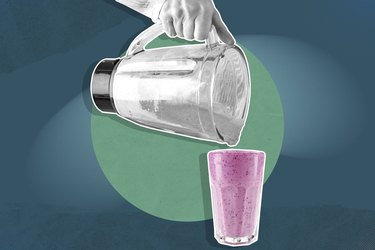
We get it if coffee's your main motivation for getting out of bed in the morning. While many of us share a passion for java, how wetakeour coffeecan look completely different. Some like it straight up; others swear by syrups; there are those who require creamer. And still, some believe in the powers of Bulletproof coffee.
Below, we explain everything you need to know about Bulletproof coffee, including what it is and whether you should make it a part of your mornings, according to registered dietitians.
Video of the Day
What Is Bulletproof Coffee?
Popularized by Bulletproof Diet creator Dave Asprey in 2011, Bulletproof coffee is made from brewed coffee, grass-fed butter or ghee andmedium chain triglyceride (MCT) oilthat all get blended together to create a keto-friendly beverage.
Because the Bulletproof eating pattern fuses间歇性禁食with theketogenic diet, its backbone, Bulletproof coffee, is meant to replace a morning meal.
According to theBulletproof website, the buzzy beverage's key ingredients — MCT oil and either grass-fed butter or ghee — are its secret sauce. Why? "MCT oils are easily digested and absorbed due to their unique chemical structure," explainsAnya Rosen, RD, IFNCP, registered dietitian, functional medicine practitioner and founder of the Birchwell Clinic.
Allow us to explain: The fats found in our food can be made up of short, medium and long-chains of fatty acids. Long-chain fatty acids are, not surprisingly, larger. As a result, they undergo a number of steps during digestion, including getting broken down, repackaged and then transported through the lymphatic system before hitting our bloodstream.
The body handles medium-chain triglycerides differently. "MCTs are able to travel directly to the liver, which fast-tracks the body's ability to utilize them for energy," Rosen says.
In the absence of carbohydrates (as in the low-carb Bulletproof Diet), MCTs may be converted into ketones, which can act as a source of quick fuel for the brain. The body's unique metabolism of MCTs is why Asprey and others claim that Bulletproof coffee delivers "more brain power and sustained energy" to those who drink it.
Why the inclusion of grass-fed butter or ghee in the Bulletproof coffee recipe? These additional fats are meant to make Bulletproof coffee extra filling, provide a rich mouthfeel and serve up some nutrients.
In addition to being higher in omega-3s, grass-fed "yellow butter has a higher vitamin A content, while ghee has less lactose and casein," explainsWendy Bazilian, RD, DrPH, registered dietitian and author of theEat Clean, Stay Leanseries.
More on MCTs
There’s nothing new about MCTs. The easy-to-digest lipids have long been given to people who lack the necessary enzymes to absorb dietary fats. People who are missing part of their small intestine, for example, may be given supplemental MCTs to prevent fat malabsorption. “It has also traditionally been used in medical care to manage epilepsy in children [who are following] therapeutic ketogenic diets,” Rosen says.
Bulletproof Coffee Nutritional Information
根据防弹网站,1杯of Bulletproof coffee contains:
- Calories:230
- Total fat:25 g
- Saturated fat:21 g
- Carbohydrates:0 g
- Fiber:0 g
- Protein:0 g
Benefits of Bulletproof Coffee
1. It Could Blunt a Caffeine Crash
If you're accustomed tostrict intermittent fasting, adding a cup of Bulletproof coffee to your morning may not be the worst idea.
"One benefit of consuming Bulletproof coffee in the morning compared to only black coffee is that its fat can help slow down the body's absorption of caffeine," Rosen says. "This can help blunt the spike and subsequent crash in energy that is often experienced when consumingcaffeine on an empty stomach."
2. It Might Curb Your Appetite
Some research suggests that MCTs may promote increased energy expenditure and support greater satiety, Rosen says.
A very small October 2014 study in theEuropean Journal of Clinical Nutritionreported that people given MCT supplements at breakfast ate significantly fewer calories at lunch compared to people who were given a long-chain triglyceride (LCT) supplement at breakfast. Exactly why this happened is unclear, though, as the researchers found that those who had breakfast with LCTs experiencedgreaterreductions in the concentration of hunger hormones like ghrelin in their blood.
3. It May Promote Weight Loss… Temporarily
People following the Bulletproof Diet are meant to enter a state of ketosis in which the body burns fat instead of carbs for fuel. Not surprisingly then, "weight loss is for sure one likely outcome" of the program, Dr. Bazilian says.
In addition to promoting weight loss, a ketogenic-style diet may help to reduce insulin resistance and sugar cravings, but its benefits are often short-lived — and also come at a price.
Potentialside effects of the keto dietinclude dehydration, electrolyte imbalances, digestive issues like constipation, vitamin and mineral deficiencies and elevated blood cholesterol levels, among others, Dr. Bazilian says.
Plus, this eating pattern is highly restrictive. "Restriction works for some peopletemporarilybecause it's more clear cut," Dr. Bazilian says. But that all-or-nothing approach isn't likely to last. After all, who wants to replace brunch with Bulletproof coffee for the rest of their life?
Risks of Bulletproof Coffee
1. It Can Spike Your Cholesterol Levels
The number one culprit forhigh cholesterol levelsis saturated fat, and just 1 cup of Bulletproof coffee contains a boatload of it.
TheAmerican Heart Associationrecommends that no more than 5 to 6 percent of our daily calories come from saturated fat. On a 2,000 calorie-per-day diet, that translates to a goal of just13 grams of saturated fat daily. For reference, 1 cup of Bulletproof coffee serves up 21 grams of saturated fat — that's more than 1.5 times our recommended allotment for theentireday.
Anyone with elevated cholesterol or at risk of heart disease should proceed with caution when considering integrating Bulletproof coffee into their diet. "Prevailing research for cardiovascular health still favors more polyunsaturated fats and less saturated fats," Dr. Bazilian says.
Starting the day with a Bulletproof coffee may keep you feeling full and energized, but it could also coincide with a serious uptick in cholesterol on your next lipid panel.
2. It Doesn't Compete With a Balanced Breakfast
"While [Bulletproof coffee] might be satisfying to some, it doesn't take the place of a nutritious meal or snack," Dr. Bazilian says.
通过替换balanced breakfastwith a cup of caffeine that's full of liquid calories, we miss out on a key opportunity to incorporate lean protein, quality carbohydrates and phytonutrients from fruits and vegetables in our diets.
On the flip side, having this high-calorie drink inadditionto your usual balanced breakfast can also pose problems.
"We don't often 'count' our beverages in the same way as we count our foods and meals," Dr. Bazilian says. "Not everyone can add this 230-calorie beverage to their existing diet without having to make some other changes… It can take up too much space in the diet and run the risk of pushing out other [nutrient-dense] foods."
The Bottom Line
Before jumping on the Bulletproof coffee train, consider how the drink could affect your heart health.
"Consuming an excessive amount of saturated fat can be problematic for individuals at risk for cardiovascular disease," Rosen says. Those at risk of (or already diagnosed with) heart disease should instead emphasizeunsaturated fatslike those found in nuts, seeds, vegetable oils and avocado.
Dr. Bazilian also encourages people to consider questions like:How does this fit into my diet? How often am I going to drink it? Is this choice aligned with my health goals?And, perhaps most importantly,Do I even enjoy this?
So many people try something because they've heard it's good for them but don't actually like it, Dr. Bazilian says. Better to identify nutrient-dense foods and flavors you genuinely enjoy. And remember: "One choice like this won't make or break a person… but it's not on the top 10 (or maybe even top 20, 30 or 40) list of what I'd advise as a health-enhancing behavior," Dr. Bazilian says.
- European Journal of Clinical Nutrition: "The Effect of Replacing Dietary Saturated Fat With Polyunsaturated or monounsaturated Fat on Plasma Lipids in Free-Living Young Adults"
- American Heart Association: "Saturated Fat"
- European Journal of Clinical Nutrition: “Impact of Medium and Long Chain Triglycerides Consumption on Appetite and Food iIntake in Overweight Men”
- Bulletproof: "Bulletproof Coffee Recipe"



